Search
Showing 10 of 1803 results for NARSC 2016 July student registration fees
-
US students attend Kiwi youth leadership summit
Hosted at the University of Canterbury and led by ENZ and the Ministry of Foreign Affairs and Trade, the Marjory Stoneman Douglas High School (MSD) students teamed up with the Student Volunteer Army to discuss student leadership and mobilisation.
Over five days, they heard from prominent speakers from across New Zealand’s business, government, university and non-profit sectors. Students also conducted a tree-planting project, held panel discussions and visited Government House in Wellington at the invitation of Governor General Dame Patsy Reddy.
In February, Marjory Stoneman Douglas High School (MSD) became the site of one of the deadliest school shootings US history. In the aftermath, MSD students mobilised to create a student-led ‘Never Again MSD’ organisation, and used their time in New Zealand to learn about the leadership of the Student Volunteer Army, which mobilised following the 2011 Christchurch earthquake.
ENZ’s Director for the Americas and Europe, Lisa Futschek, said the summit was an exceptional opportunity to raise the profile of New Zealand’s education system in the US, and to demonstrate how it equips young people to become independent leaders, thinkers and global citizens.
“The Summit was a great example of how international education can equip and inspire emerging global influencers and leaders.
“It was great to see New Zealand featured in high profile publications including the New York Times, The Washington Post and the Los Angeles Times, along with major US television networks showcasing our country as a desirable international education destination, well placed to host aspiring student leaders.”
US student numbers in New Zealand grew seven percent from 2016 (2,852) to 2017 (3,050) – the majority at university level.



-
Strengthening the international student experience
The true value of education starts with a great experience for the international students who choose New Zealand. These experiences help us to foster long-lasting connections with the rest of the world. These connections support the social, cultural and economic relationships New Zealand needs for its own prosperity.
In May we responded to allegations of visa fraud. With 125,000 international students studying in New Zealand last year, our industry is strong. To maintain the momentum we need sustainable growth. We all have a responsibility to make sure we have our settings right to attract the right students to the right programmes.
Education providers are at the heart of this. We have an industry of high performing institutions delivering outstanding programmes and products for domestic and international students. However, we acknowledge the concerns that have been expressed in the media around a small number of providers.
At Education New Zealand (ENZ) we are working more closely than ever before with our New Zealand government agencies. We are serious about our role in building a strong, sustainable international education system that works for New Zealand. We are committed to a joined up New Zealand Government approach to tackle issues of non-compliance which negatively impact on the exceptional contribution made by most of the 850 New Zealand providers enrolling international students.
ENZ welcomes the new code of practice for international students launched on 1 July as a way of strengthening provider engagement and responsibility for the student experience and with the agents New Zealand providers are working with.
Providers are the link between agents and student flows. We will be supporting providers to do the right thing, which the vast majority do, and continue working with other New Zealand government agencies for them to better understand where some providers may not be meeting these expectations. This will help us to help the industry safeguard our reputation as a world-class education destination and to protect the education brand that we have built together.
While market diversification is important for us, education markets like India are going to remain a critical part of our industry. Within the next five years India will have the largest tertiary-age population in the world with a middle class expected to grow to around 500 million. The demand for higher education is only going to continue to grow.
To be a part of this opportunity, we need to remain aspirational but we also acknowledge that we need to be smarter in how we operate.
We all need to be thinking long-term about what international education means to New Zealand. We are about sustainability, quality, value and integrity. We are about supporting mutual benefit and need to continually look at the value our own domestic students gain from international engagement. Done well, international education contributes hugely to our positioning in the global community.
Telling the international education story and showcasing the benefits it brings to New Zealand and New Zealanders is a top priority for ENZ. We encourage you to work with each other, your communities, and with us, to continue to highlight the value and vibrancy that international education brings to New Zealand.
John Goulter, Acting Chief Executive Education New Zealand
-
Ask New Anything
Campaign page: https://www.studyinnewzealand.govt.nz/asknewanything

NZ’s second big global digital campaign of 2019 launched on 7 October with our students at the heart of it.
The campaign will be promoted digitally in our key markets for 8 weeks. Campaign-related content and messaging will remain relevant and live on our channels for the foreseeable future.
The campaign will be the first time the refreshed Think New brand has been widely used in digital channels.
- Campaign strategy
- Creative concept
- Technical execution
- The campaign in China
- Messaging and brand
- Sector representation and localisation
- Campaign toolkit
Campaign Strategy
The main objective of the campaign is to challenge perceptions of New Zealand by increasing awareness of the country as a high-quality study destination. The campaign aims to achieve this by inviting our target audiences in 14 international markets to question what they know about New Zealand.
Key markets that will be reached by the campaign are:
- Brazil
- Colombia
- France
- Germany
- India
- Italy
- Japan
- Korea
- Philippines
- Thailand
- UK
- USA
- Vietnam
- Indonesia
The campaign aims to increase New Zealand’s standing as the preferred study destination amongst our target audiences in these key markets.
For more information about ENZ’s target markets and the general digital campaign strategy, and New Zealand education providers can access the 2019 ENZ Digital Marketing Calendar on IntelliLab.
The creative concept and technical execution of this campaign will push ENZ into new territory for its marketing campaigns and award-winning digital strategy.
Utilising 100 short videos, a variety of digital media placements, Tohu the chatbot, a range of social media channels including a peer-to-peer Facebook group and Instagram Live sessions hosted by our Kiwi Ambassadors, the campaign embodies the authenticity and bold NEW thinking of the Think New brand.
A bespoke campaign strategy has been developed for China, making use of the same campaign creative concept and content, but delivered through the channels we know our audiences in China use and interact with the most.
ENZ invites and encourages our New Zealand education sector partners and education agents to participate in the campaign by sharing content and aligning your own messaging with those of the campaign and the Think New brand.
The campaign tool kit below provides more information around how your organisation can leverage the campaign.
Creative concept
Brand research tells us there is generally low awareness of New Zealand internationally, and where there is awareness it’s often based on incorrect perceptions of quality.
The creative concept of the Ask New Anything campaign seeks to address this by answering prospective students’ burning questions authentically and honestly, using unscripted video responses from current international students.
We started by researching the most used Google search terms relevant to studying in New Zealand, as well as the most asked questions on our Study in New Zealand chatbot Tohu. We combined this hard data with anecdotal questions from prospective and current students around what they want to know/what they wish they had known, and key brand messages we hoped to get across to our audiences.
From this we narrowed down to a list of 100 questions and filmed videos with international and New Zealand students, alumni, a teacher, a parent, and a New Zealand employer providing the answers. These videos form the basis of the campaign.
We also know that word of mouth is a key influence on student decision making. The Ask New Anything campaign not only offers pre-recorded Q&As with current students, but also gives prospective students the opportunity to talk directly to current students through a new Facebook group and scheduled Instagram Live events.
All of this results in a much more interactive campaign than anything ENZ has previously done. We’re not broadcasting a message to students; we’re asking them to start a conversation, putting prospective students themselves at the centre of the campaign.
Technical execution
A typical digital media campaign uses creative digital ad placements on social media, relevant websites and search engines to drive traffic through to a campaign landing page on a website.
Ask New Anything goes well beyond this, using new technology and a broad range of social media tools to be a true omni-channel campaign. The resulting immersive and pleasantly unexpected experience will help the Think New brand stand out.
The marketing activity and technology being used in this campaign includes:
- Tohu the chatbot – Tohu was launched on the Study in New Zealand website in 2018, on Facebook Messenger in early 2019, and on the NauMai NZ website in July 2019. Tohu is the centrepiece of the Ask New Anything campaign as it represents the technology through which prospective students can really ask any question they want. From the launch of the Ask New Anything campaign, Tohu will be able to respond to 100 of the most frequently asked questions with one of the short videos created for the campaign
- Facebook group - Should a question be asked that Tohu cannot answer, prospective students will be invited to join a Facebook group where they can ask real students their questions in real time. The Facebook group will be managed and moderated by our Kiwi Ambassadors.
- Instagram Live – Throughout the campaign, a select group of Kiwi Ambassadors will host a series of Instagram Live events. These events will be designed and scheduled to suit the key international regions we are targeting in the campaign.
- Campaign landing page – There will be a campaign landing page on the Study in New Zealand website. Tohu the chatbot will be the main focus of this page.
- Social media – Beyond the Facebook group, Instagram Live sessions and use of Tohu on Facebook Messenger, all of ENZ’s student-facing social media channels will be driving the campaign messages. Campaign content will be shared on Facebook, and YouTube and Instagram will feature strongly for both organic and paid media content.
- Database marketing – The database marketing strategy for the campaign ensures we are reaching all our currently engaged audiences, and nurturing new leads throughout their decision-making journey. Personalised email campaigns will be sent to members of the Study in New Zealand, My StudyNZ and NauMai NZ communities, and to anyone who signs up throughout the campaign period.
The campaign in China
Because our audiences in China use different digital platforms to our other markets, the Ask New Anything campaign will follow a different strategy in China.
Separate research has been undertaken to identify the most-asked questions for prospective international students in China. Based on this, the most relevant videos will be translated into Chinese and integrated into a campaign rollout on our China platforms:
Paid media:
- Zhihu (Zhihu is China’s version of Quora. In classical Chinese, "Zhīhū" means "Know?". Chinese-language internet users nowadays increasingly resort to Zhihu for expert knowledge and insights into various topics.
Owned media:
Tohu the chatbot does not exist on our Chinese platforms, so the China Ask New Anything campaign makes use of the question/answer format in a different way, posing questions to our audience and then supplying key information based on their response.
On the Zhihu platform we will post questions for both Kiwi Ambassadors and users to answer. Key Opinion Leaders (KOLs) will also be recruited to support the campaign and both ask and answer questions about studying in New Zealand.
Messaging and Brand
The campaign concept and the technical execution of the campaign both contribute to the overall brand message of ‘I am New’. It showcases our innovative new thinking and captures New Zealand’s values of societal openness, transparency and manaakitanga.
Through this campaign, we want to show that New Zealand is an inclusive, collaborative and progressive environment where students are challenged and supported to reach their full potential.
Our new Think New brand strategy and creative approach position our international education brand for success and redefine what a quality education looks like and means.
Sector representation and localisation
The 100 question and answer videos have been carefully planned to ensure a good global representation of our markets. Care has been taken to match the talent to questions based region. So where a question is most important to a certain region, the talent has been matched to that region to ensure the most relevant response.
The videos feature 18 different individuals representing a spread of sectors and markets. We have included students from all the key markets we are targeting in the campaign. A teacher, employer, Kiwi student and parent are also included.
In the Facebook group and Instagram Live sessions, prospective students will be able to converse with Kiwi Ambassadors in local language – either directly or with the help of Facebook’s automatic translation technology.
Toolkit
Throughout the campaign duration New Zealand education will have an increased digital presence in the 13 target markets listed above.
New Zealand education providers and education agents are encouraged to leverage this campaign activity for your own marketing strategies.
Here is a toolkit of resources and suggested actions to help you get started:
- Ensure your institution profile on the Study in New Zealand website is up to date. Follow these step-by-step instructions to find out how. Please note you will be required a login to access this link.
- Register for the ENZ Brand Lab. There are over 1,000 images, videos and more available on the Brand Lab for you to download and use in your marketing.
- Read this article about how to leverage ENZ digital campaigns. You will need to be registered and signed in to the Brand Lab to access it.
- Share the Q&A videos from the campaign on your social media channels. ENZ will be creating a spreadsheet with all the YouTube links to make this easy for you navigate and choose the most relevant videos for your audiences. Watch this space or sign up to the Brand Lab to get a notification when this becomes available.
- Download ENZ’s 2019 Digital Marketing Calendar from IntelliLab. The calendar explains our key dates and strategies for each of our target markets. You will need to be registered and signed in to IntelliLab to access this.
- If you are an education agent, join ENZ’s AgentLab. This new platform was launched this year. Gain access to online training courses, news, webinars and ENZ updates.
-
International Student Hardship Fund now fully allocated
The fund first opened for applications on 21 May. It was met with immediate interest by a wide variety of education institutions and community groups.
A cross-ENZ team named Kāhui Oranga was charged with the fund’s administration. They met twice weekly to go through applications and ensure a balanced allocation of funds between regions, sectors and institutions.
Education providers and community organisations are disseminating grants from the fund to international students in the form of cash grants, food parcels and accommodation support.
ENZ Director of Student Experience and Global Citizens, Sahinde Pala, led Kāhui Oranga. She says the government was glad to be able to offer international students tangible support in such an uncertain time.
“At ENZ we talk a lot about manaakitanga – the offering of hospitality and respect to guests. We really want every student that comes to New Zealand to feel valued,” she says.
“It was obvious once the impacts of COVID-19 began to be felt here that we needed to offer our international students most in need extra support during these difficult times.”
Last week, Deputy Prime Minister Winston Peters and Minister for the Community and Voluntary Sector, Poto Williams, announced the Assistance for Foreign Nationals impacted by COVID-19 Programme.
This $37.6 million fund will open on 1 July and be administered by the Department of Internal Affairs. International students experiencing serious hardship will be able to apply to this programme to receive support with basic needs such as food and accommodation.
-
Prime Minister welcomes international students
One of many welcome events around the country since our borders reopened at the end of July, the ceremony was attended by more than 70 students, as well as representatives of UoA and Education New Zealand Manapou ki te Ao (ENZ). It was an emotional moment for some of the students, who had been waiting a long time for the opportunity to study here.
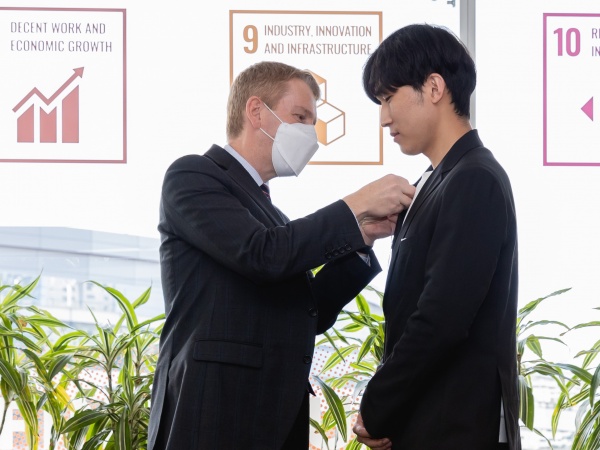
Minister Hipkins presenting a Tū Ngātahi pin to international student Kyeongmin Kang from English Language Academy
Tū Ngātahi pins were presented to international students Petchpiangpor Sueasuwan from Western Springs College; Kyeongmin Kang from English Language Academy; and Ankeeta Karmakar from UoA by the Prime Minister, Minister Hipkins and UoA Vice-Chancellor, Professor Dawn Freshwater respectively.
ENZ Chief Executive Grant McPherson explained the significance of the Tū Ngātahi pins, which you can read more about here.
The formal welcome was followed by morning tea, with further exchanges of Tū Ngātahi pins and opportunities for photographs.
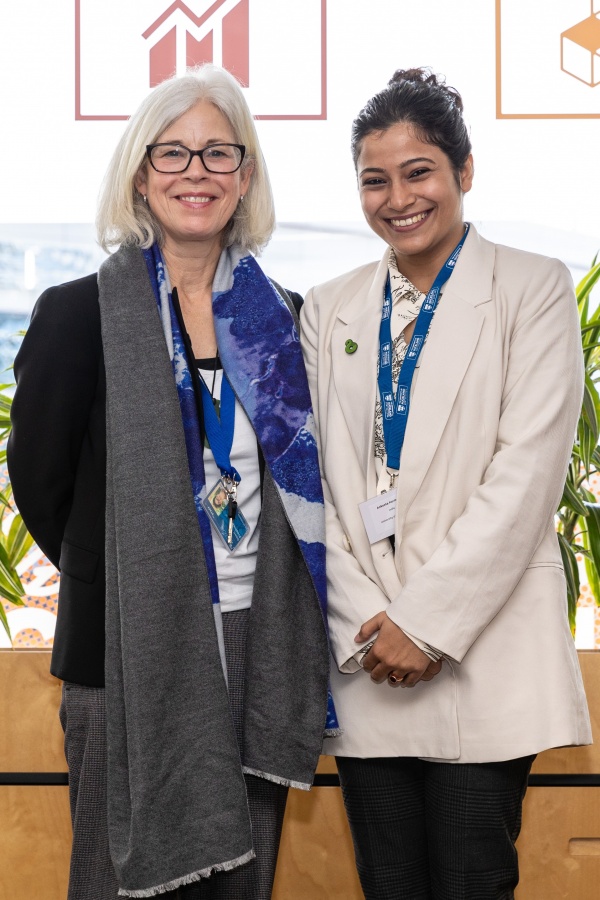
Professor Dawn Freshwater, Vice-Chancellor at University of Auckland, with university student Ankeeta Karmakar.
International student Malina Grube from the University of Auckland spoke about her experiences here, and her involvement in the kākahu project.
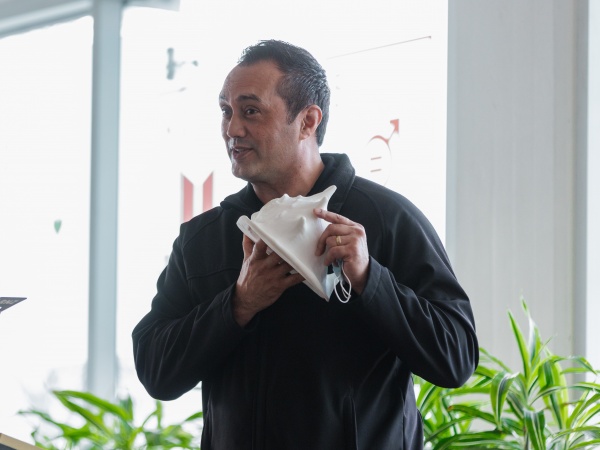
Michael Steedman, Kaiarataki at the University of Auckland, demonstrated a 3D-printed conch shell as part of his welcome to guests – a metaphor for new arrivals and new opportunities.
-
New Zealand Schools Scholarships 2024 launches in Viet Nam
This scholarship, launched by Education New Zealand Manapou ki te Ao (ENZ) and New Zealand schools, provides a 50% subsidy towards selected Vietnamese middle and high school students currently in grades 8 – 10 in Viet Nam. Applications opened on 22nd January 2024 and close at 11:59pm Indochina Time on 17th March 2024.
Interest in studying with New Zealand remains high amongst students and parents in Viet Nam, with recent fairs held in both Ho Chi Minh City and Hanoi receiving between 400-500 attendees respectively.
Viet Nam continues to be a priority market for New Zealand schools. Pre-COVID, the sector saw 80 percent growth in students from Viet Nam between 2017 and 2019. Currently, Vietnamese high school students account for 15% of the entire Vietnamese student base here in New Zealand.
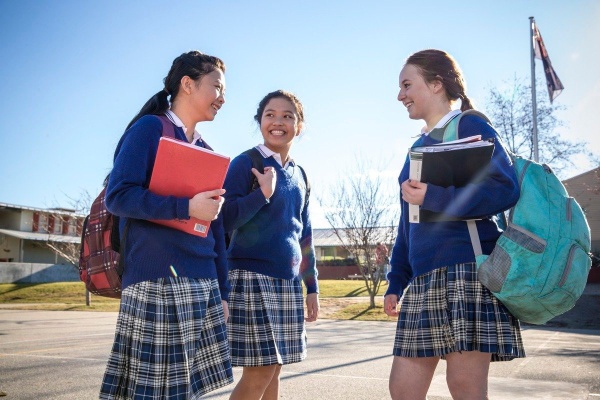
This initiative aims to simultaneously increase interest and enrolments from high quality Vietnamese students into New Zealand schools, whilst also providing support to the students and families themselves by reducing the financial barrier to study overseas.
ENZ’s Business Development Manager Mary Camp said the New Zealand School Scholarships initiative has attracted quality students with high grade point average and good English language ability to study in New Zealand.
“We are impressed with the calibre of students we have welcomed through this programme. Many of them have had academic success and gone on to study at high-quality universities in NZ.”
“Schools are excited to welcome students from Viet Nam and eager for them to experience our quality education in a safe and nurturing environment.
Mary added that the support of the Schools in International Education Business Association (SIEBA) has been valuable.
“SIEBA supports this programme by undertaking reference checks of interested education agents, thus reducing the burden on schools and helping them connect with new agents. Activating new agents in Viet Nam helps the entire sector”.
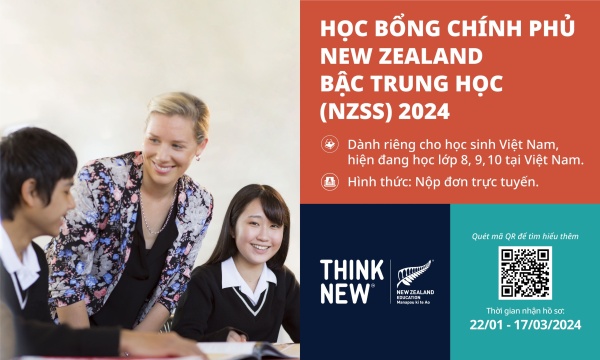
ENZ’s Regional Director – Asia, Ben Burrowes said he was pleased to see the New Zealand Schools Scholarships initiative continue in 2024.
“ENZ is absolutely committed to its education relationship with Viet Nam and we’re excited to welcome more scholarship winners this year, enriching our schools, classrooms and communities here in New Zealand.
"As the scholarship continues to run each year, it allows new scholarship winners to meet previous scholarship winners and form a community of their own,” said Ben.
"Since its initial launch in 2018, the New Zealand School Scholarships initiative in Viet Nam has grown to become a prestigious, top of mind scholarship for local students," he added.
The New Zealand School Scholarship initiative is just one of the initiatives that Education New Zealand Manapou ki te Ao delivers as part of its investments into the Vietnamese – New Zealand relationship. Other initiatives include student fairs, co-funding agent events and engagements, media and PR initiatives as well as supporting institutional partnerships.
Celebrating past recipients of the New Zealand School Scholarship
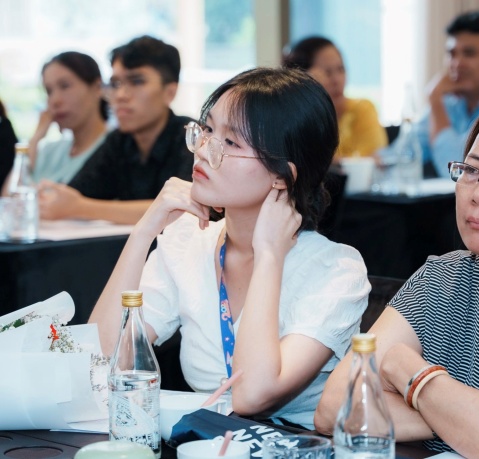
Dinh Minh Thao
2023 New Zealand School Scholarship recipientWith a strong desire to venture beyond her comfort zone, Dinh Minh Thao courageously applied for and successfully attained the NZSS 2023, starting her educational journey at Newlands College (Wellington, New Zealand) in July 2023.
In just six months, she immersed herself in studies, actively participated in various extracurricular activities, and experienced numerous "first in life" experiences including contributing to cultural events and participating in the festival of the Indian community. Notably, she challenged herself by becoming the class representative for the "Year 10 Speech Competition," typically reserved for upper grades, winning the coveted "Public Speaking" trophy.
Expressing her gratitude, Minh Thao stated, "Thanks to the NZSS, I have set foot in New Zealand, embarking on a journey towards independence and confidence, thus evolving into a new version of myself. I am eagerly anticipating the exploration of new opportunities that Kiwiland will unfold in 2024."
- Dinh

Xuan Khang
2019 New Zealand School Scholarship recipientXuan Khang came to Pakuranga College in July 2019 and graduated at the end of 2022. He remained in New Zealand throughout the pandemic, and achieved an outstanding academic record. He passed NCEA Levels 1 to 3 endorsed with Merit or Excellence, gaining Excellence in both Level 3 Calculus and Chemistry. He was involved in the Academic Council, Environmental Council, the Service Council, the Cultural Council and Peer Support. Xuan Khang won Top Academic International Student at senior prize-giving in 2022 and is studying Engineering at the University of Auckland in 2023.
"I came to New Zealand to broaden my horizons and become more independent. I have really enjoyed the practical aspects of working in labs and putting theory into practice. By using English daily, I feel my English has improved to a high standard. I have enjoyed being able to discuss my work with my teachers, who have been friendly and helpful. I feel I have really benefitted from the opportunities provided by living in New Zealand and studying at Pakuranga College."
- Xuan
-
69,000 international student enrolments in 2023
The latest figures show that there were 69,135 international student enrolments* with New Zealand education providers in 2023. This represents a 67 per cent increase compared to the full year in 2022 and 60 per cent of annual enrolments in 2019.
“Over 69,000 enrolments from international students all over the world is good news for our education sector and positive for our communities,” said Dr Linda Sissons, Acting Chief Executive of Education New Zealand Manapou ki te Ao.
“It confirms that New Zealand is an attractive place to study, offering a quality learning experience inside and outside the classroom in a safe, welcoming environment.”
“New Zealand is a small country and for many students, rubbing shoulders with people from other cultures gives them a greater understanding of the issues facing our complex world. In this time of fragile geopolitics, the melting pot of campus life can help build greater understanding and tolerance.”
The university subsector saw the strongest recovery with 29,065 students, representing 86 per cent of 2019 enrolments. Universities and schools are New Zealand’s two largest subsectors for international students.
International student enrolments have grown compared to 2022 in all subsectors except wānanga. English Language Schools saw the greatest percentage increase in international enrolments, lifting by 511 per cent from 1,565 to 9,570.
As with all New Zealand’s competitors in the international education sector, China is the largest source market for international students at 35 per cent.
India is second largest at 11 per cent, Japan at 10 per cent, South Korea at five per cent and Thailand at four per cent. Of the other source countries, no other country represented more than four per cent of total enrolments.
“Enabling a thriving and globally connected New Zealand through world-class international education is a government priority. We are actively diversifying our recruitment efforts to reach international students in a broad range of countries,” Dr Sissons said.
More information on enrolment numbers can be found here.Note: * One individual may enrol more than once
For further information:
Justin Barnett | Director of Communications, Education New Zealand
+64 21 875 132
About Education New Zealand (ENZ) https://www.enz.govt.nz/
Education New Zealand Manapou ki te Ao (ENZ) is the government agency dedicated to helping Aotearoa New Zealand realise the social, cultural, and economic benefits of international education. Our role is to promote New Zealand as a high-quality education destination offering excellent education and students experiences and to encourage New Zealand students to study overseas.
With approximately 110 staff in 16 locations around the world, ENZ works closely with New Zealand’s diverse education sector which includes schools, English language providers, Private Training Establishments, Institutes of Technology and Polytechnics (Te Pūkenga), and universities. Internationally, we work with a range of education stakeholders, including government agencies and education providers to identify and encourage sustainable growth opportunities for New Zealand’s education sector.
This page was last updated on 23 July 2024.
-
From the CE: Growth on the go
Kia ora koutou,
This month, the Government announced the International Education Going for Growth Plan – this is an exciting, positive step forward for international education as we chase a big growth target to double the value of New Zealand international education by 2034.
It’s an ambitious target. However, with the strong and steady growth we have seen in international student numbers in 2024, the Growth Plan will help us boost that growth track to make New Zealand the destination of choice for international students.
At its heart, the Growth Plan is about striking the right balance between achieving sustainable growth for the sector, while providing our international students with an excellent experience in New Zealand and enabling our communities to understand the broad benefits that international education brings.
I am pleased with the work that is underway to progress the plan’s implementation. Over July and early August, ENZ is holding a series of market focused, cross-sector sessions to share market plans for 2025-26. The sessions will provide sector representatives with a topline update on market plans, growth targets, the approach for subsectors, and market activity.
I believe these sessions will prove useful in clarifying how ENZ intends to engage with the sector to activate and deliver the plan.
And with the way our latest 2024 enrolment numbers have continued their upward surge, we are on the right track to advance towards our growth goals. Our enrolments are now at 72 percent of pre-pandemic levels seen in 2019, with most sub-sectors contributing to this growth.
We are also seeing interesting trends in these enrolment numbers across subsectors, level of study and source markets and we look forward to sharing these insights with the sector. So make sure you sign up for ENZ’s webinar on 2024 international student enrolments to learn more about emerging trends with students, and how you can use this information in your organisational planning.
Last week, we said farewell to two of ENZ’s long-serving Board members, Linda Sissons and Lyn Provost, who completed their terms, and welcomed new members Sara Brownlie and Prabha Ravi with a mihi whakatau.
Finally, this week, I will be attending The PIE Live Asia Pacific event, where I will be speaking at a ‘New Zealand: Country update and trends’ panel session alongside University of Canterbury Vice-Chancellor Cheryl de la Rey and Deputy Editor of The PIE News UK, Kimberley Martin.
The session will discuss how New Zealand is poised for sustainable growth in international education and will cover the New Zealand International Education Going for Growth Plan and its ambitious target to double the value of international education by 2034.
For those of you attending the event, I look forward to seeing you there.
Waiho i te toipoto, kaua i te toiroa
Let there be closeness, not distance
Ngā mihi nui,
Amanda Malu
Chief Executive
-
Media roundtable highlights employers’ need for well-rounded talent
Guest speakers included Dr John Subritzky, New Zealand High Commissioner to Malaysia; Ryan Carroll, Director of Randstad Malaysia; Richard Tan, co-founder and Managing Director of lelong.com.my; and Jane Goh, ENZ Marketing and Strategic Relations Manager.
The roundtable was well-received by the 11 editors and journalists who attended.
Ryan Carroll said employers in Malaysia want talented individuals who possess various skills and competencies.
“Employers today are looking for someone who can help the organisation produce productivity gains. They want candidates who have good skills in project management, are competent in the digital and social media space, and are confident communicators. All these can be acquired through internships, part-time work or even working on charity projects.
“While it is still important that potential employees have the relevant skills and workplace experiences, they must also be able to articulate effectively about how they can contribute to the company. For example, if they have worked on a particular case study or project in university, they need to be confident talking about their experiences and what they learnt during that process,” Mr Carroll said.
Dr Subritzky spoke about the New Zealand education system and institutions are committed to developing holistic educational experiences that are relevant to the workplace.
“New Zealand recognises the importance of a well-rounded education to employability, which is why our education system focuses on helping students transition from academic life into the working world,” he said.
Richard Tan, a Victoria University of Wellington alumnus, shared his experiences studying in New Zealand.
“What I liked about the New Zealand education system is that it encourages students to pursue and develop their interests. It doesn’t force a student into a particular stream but focuses on teaching him or her how to acquire information and meaningfully apply that knowledge across various situations. This means that even as a pure science student, I was given the flexibility to explore other areas of interest to me such as accountancy.
“I was also able to work part-time at various places and this helped me pick up softer skills such as communicating effectively with peers and dealing with different types of personalities, which then eventually helped me in my career,” Mr Tan shared.
Over the last year, New Zealand has seen an increase in Malaysian student numbers.
“There was a 23 per cent increase in the number of first-time student visas approved year to-date in June 2016. In particular, we saw an increase in the number of student visas approved for the universities and Institutes of Technology and Polytechnics (ITPs) sectors,” said Jane Goh.

The media roundtable was well-received by media. A total of 11 editors and journalists attended.
-
New approach for Korean middle schools
The Korean government wants to improve levels of student happiness, and move on from students validating their success and self-worth only in terms of academic performance. A priority is to support students to pursue “non-core learning areas” (such as music, arts, physical education, career exploration, club-oriented activities, etc). Each school will now designate a semester that is exam- and test-free to allow students to experience a wide range of these activities.
This approach represents a big change in the Korean education environment. To date these students have relied heavily on simple memorisation and rote learning instead of thinking creatively or critically. The government now expects students to freely discover their competencies and capability, free from the stress associated with exams. Korean President Park Geun-hye describes this initiative as a “key task to fundamentally change Korea’s education system”.
Under this new initiative, schools will teach students using diverse and engaging methods such as discussion, experiments, outdoor activities and team projects. Opportunities for students to engage with activities that may inform their thinking about future career options and/or future subject choices is also encouraged.
The initiative began as a pilot in September 2013 with 42 Korean middle schools (1 percent of all Korean middle schools). It was expanded in 2014 to around 800 schools (25 percent), and to 1,500 schools in 2015 (nearly 50 percent). This year, all 3,204 middle schools – and their 1.5 million students – will implement this approach.
Opportunities for NZ schools
This new way of working not only requires a significant paradigm change in thinking for educators and parents, it also requires Korea to develop new infrastructure outside the classroom. It may therefore take some time to fully develop.
This new initiative presents an opportunity for New Zealand schools; two groups of Korean parents may be interested in sending their children to study abroad during the exam-free semester:
-
Families that wish to take advantage of the New Zealand curriculum, teaching expertise and existing infrastructure in terms of these broader subject areas (especially opportunities to learn outside of the classroom that are available at New Zealand’s intermediate schools); or
-
Families that have a more traditional Korean academic education preference and wish to provide their children with an intensive learning experience (such as significantly develop their English language skills).
New Zealand schools may therefore wish to reframe their marketing collateral for parents to demonstrate the strengths of their school’s programmes to deliver quality educational outcomes for Korean middle school students during these exam-free semesters.
FAQs
What age and year level are Korean middle school students?
Students in Korea start school at age seven, rather than five, the usual age in New Zealand. Korean middle school students are in years seven and eight and aged 13-14 years. The table below compares the age and year of the two school systems.
What are the Korean school semester dates?
Korean school year is divided into two semesters, running from 1 March to mid-July, and from mid/late August to February.
Who decides which semester will be exam-free? Will it be the same semester for all schools in a region, for example?
Individual principals, in consultation with their school staff decide which semester will be selected as the ‘exam-free’ semester. This could be any semester between the first semester in the first year and the first semester of the second year.
Would this be an opportunity for students to spend the whole semester away from Korea, or are we talking about short (say 2-3 week or 4-5 week) programmes for groups?
This will likely be predominately an opportunity for individual students to study for a full semester in New Zealand.
That said, it is possible that schools with MoUs with Korean schools could promote an exchange or short course study abroad programme, but New Zealand schools who are interested in this should carefully canvas existing sister schools first to confirm whether this approach would meet the requirements.
What does experiential learning mean in Korea?
The following four types of activities have been recommended by the Korean Ministry of Education:
-
Topic of interest: students choose topic(s) of interest and participate in a programme of activities around the topic, such as: entrepreneurship, design, animation, film, barista skills, smartphone app development, robotics, cooking, science etc.
-
Arts and physical education: students undertake activities that are not part of their regular school curriculum such as: participating in a musical or in a band, curating, industrial design, or physical education activities such as sports leisure industry experience or exploring career options around soccer, dancing etc.
-
Club activities: student clubs can be organised by students around topics of interest. These could be linked to other activities such as sports, career or volunteering such as a hospital volunteering group of 20 students who go to local hospitals to help out.
-
Career: students discover what employment options await; giving a chance for them to begin thinking about the sort of work they would like to do in the future and to gather information that will help them make good decisions about the courses they will undertake when they enter secondary school. This could include going into workplaces to experience, observe etc. and could also include a career counselling component.
The New Zealand curriculum, teaching techniques and education outside of the classroom experience and infrastructure appears to be a good fit with this initiative.
-

